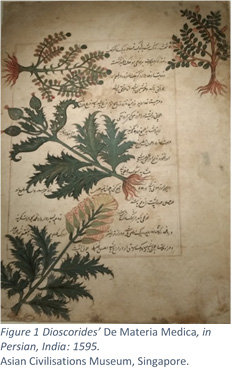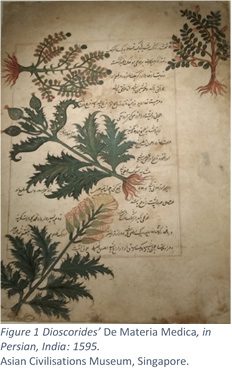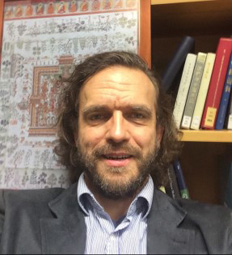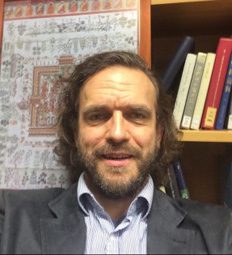- ABOUT IHSSABOUT IHSS
- PEOPLE
- NEWS & EVENTSNEWS & EVENTS
- RESEARCHRESEARCH
- FELLOWSHIPS & GRANTSFELLOWSHIPS & GRANTS
- TEACHING & LEARNINGTEACHING & LEARNING
- PUBLICATIONSPUBLICATIONS
Title:
Medicines Across Eurasia: A Digital Humanities Experiment
Speaker:
Dr. Michael Stanley-Baker (Assistant Professor, School of Humanities, Nanyang Technological University)
Date:
June 18, 2019
Time:
4:00 pm – 5:30 pm
Venue:
Room 201, 2/F, May Hall, The University of Hong Kong (Map)
English
(Tel) (852) 3917-5007
(Email) ihss@hku.hk
Medicines Across Eurasia: A Digital Humanities Experiment
Dr. Michael Stanley-Baker (Assistant Professor, School of Humanities, Nanyang Technological University)
Date:
June 18, 2019
4:00 pm – 5:30 pm
Venue:
Room 201, 2/F, May Hall, The University of Hong Kong (Map)
English
(Tel) (852) 3917-5007
(Email) ihss@hku.hk

Ancient texts document the circulation of materia medica circulate across time, across languages, across intellectual and ethnic cultures and across space. They become combined with other drugs, and these recipes also circulate, and change, according to regional access, to intellectual and ecological climate, to local economies and tastes. Histories have been written of single drugs, such as sugar, or coffee, or cinchona, tracking their movement across language, regions, genre and time. However, to study movements of multiple drugs on a large-scale, their patterns, periodization and regionalization, would require philological and linguistic expertise beyond the most gifted scholars.
Medicines Across Eurasia seeks to build fundamental tools for such narratives, by creating digital tools to house full-text primary sources, to search for thousands of drugs at once, and to do so across languages. Then to sort and analyse the results according to precise historical data, and to visualize those results.
Currently the project already handles Chinese-language sources and large term searches, and visualizes term distribution in multiple ways. A set of Daoist, Buddhist and medical texts dating up to 589 has been published online, as has a fully marked-up edition of the Bencao jing jizhu 本草經集注, including geographic distributions of the drugs. We are currently building a Chinese drug term synonymy (別名), to allow users to identify the name variations of any given medicinal.
Pending applications, I will expand the project to function with other languages, namely Sanskrit, Arabic, Hebrew, Latin and Greek for the next phase. Working with experts in these traditions, we will build from-manuscript searchable text collections on the model of the Chinese platform. This will include a cross-language drug synonymy that links ethnonyms and botanical identities through to matching ethnonyms in other languages, allowing one to use one language to search texts in other languages.

Ancient texts document the circulation of materia medica circulate across time, across languages, across intellectual and ethnic cultures and across space. They become combined with other drugs, and these recipes also circulate, and change, according to regional access, to intellectual and ecological climate, to local economies and tastes. Histories have been written of single drugs, such as sugar, or coffee, or cinchona, tracking their movement across language, regions, genre and time. However, to study movements of multiple drugs on a large-scale, their patterns, periodization and regionalization, would require philological and linguistic expertise beyond the most gifted scholars.
Medicines Across Eurasia seeks to build fundamental tools for such narratives, by creating digital tools to house full-text primary sources, to search for thousands of drugs at once, and to do so across languages. Then to sort and analyse the results according to precise historical data, and to visualize those results.
Currently the project already handles Chinese-language sources and large term searches, and visualizes term distribution in multiple ways. A set of Daoist, Buddhist and medical texts dating up to 589 has been published online, as has a fully marked-up edition of the Bencao jing jizhu 本草經集注, including geographic distributions of the drugs. We are currently building a Chinese drug term synonymy (別名), to allow users to identify the name variations of any given medicinal.
Pending applications, I will expand the project to function with other languages, namely Sanskrit, Arabic, Hebrew, Latin and Greek for the next phase. Working with experts in these traditions, we will build from-manuscript searchable text collections on the model of the Chinese platform. This will include a cross-language drug synonymy that links ethnonyms and botanical identities through to matching ethnonyms in other languages, allowing one to use one language to search texts in other languages.

Dr. Michael Stanley-Baker is an interdisciplinary medical humanities scholar interested in the relationship between Chinese medicine and religions, both in early imperial China and in the modern period, within China and abroad. He has a PhD in History of Medicine from University College London, as well as a clinical degree in Chinese medicine, and teach history and medical humanities at Nanyang Technological University, Singapore. He is interested in the ways that cultural categories such as religion and medicine organize healthcare and self-cultivation practices, and how such interrelate in various contexts in different ways at different times across history, both by practitioners and actors, as well as by scholars who study them. He approaches these questions using methodologies from history, anthropology, Sinology, Science and Technology Studies, and Digital Humanities. He is very interested in the role that critical scholarship can play in the modern understanding of these practices, and in furthering communication between the biomedical sciences, policy makers, and practitioners of Chinese and other traditional medicines.

Dr. Michael Stanley-Baker is an interdisciplinary medical humanities scholar interested in the relationship between Chinese medicine and religions, both in early imperial China and in the modern period, within China and abroad. He has a PhD in History of Medicine from University College London, as well as a clinical degree in Chinese medicine, and teach history and medical humanities at Nanyang Technological University, Singapore. He is interested in the ways that cultural categories such as religion and medicine organize healthcare and self-cultivation practices, and how such interrelate in various contexts in different ways at different times across history, both by practitioners and actors, as well as by scholars who study them. He approaches these questions using methodologies from history, anthropology, Sinology, Science and Technology Studies, and Digital Humanities. He is very interested in the role that critical scholarship can play in the modern understanding of these practices, and in furthering communication between the biomedical sciences, policy makers, and practitioners of Chinese and other traditional medicines.
This is an event jointly organized by the “Science, Technology, and Medicine in Asian Societies” Cluster of HKIHSS, Centre for the Humanities and Medicine, Medical Ethics and Humanities Unit of Li Ka-Shing Faculty of Medicine, The University of Hong Kong.
POSTER
Copyright © 2025 Hong Kong Institute for the Humanities and Social Sciences, The University of Hong Kong. All Rights Reserved.